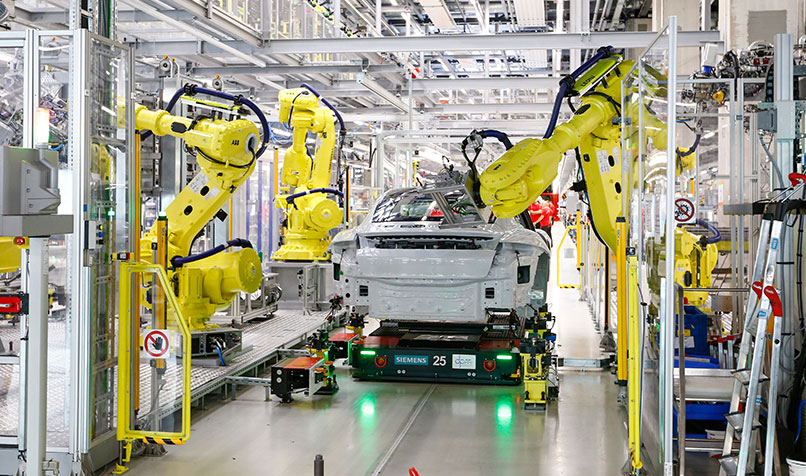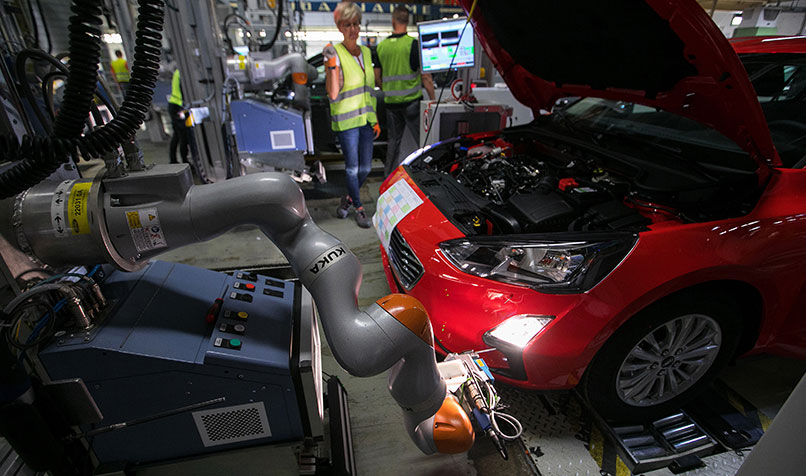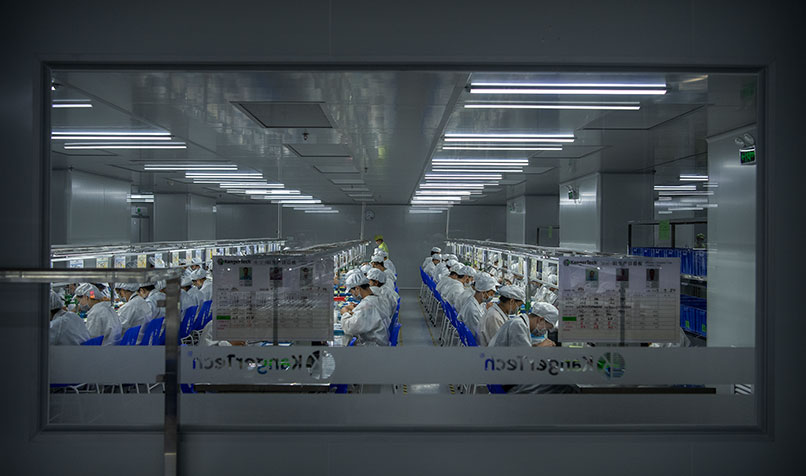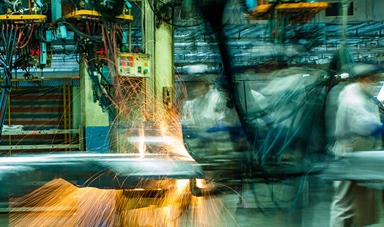Loading component...
At a glance
- The manufacturing sector is growing more export-oriented and outward-looking, and relies more on global supply chains.
- CFOs are under pressure to deliver more for less amid rising demand for faster, better and cheaper products.
- Against a global backdrop, accountants need to understand regulatory requirements in the different countries they may be selling to.
- Accountants need a strong suite of interpersonal and business skills to navigate changes in the sector.
By Johanna Leggatt
There is no doubt that manufacturing is a tough sector to excel in, and CFOs and accountants need a steely resolve and a specific set of skills to outpace the competition.
“Manufacturing is a bit of a game of survival in some respects, but that also provides the impetus and urgency for continuous improvement and innovation,” says Damian Toohey FCPA, CFO of Qenos, which manufactures polyethylene and supplies a range of specialty polymers used in food and beverages, construction, mining and energy, agriculture and water conservation.
“Manufacturing has a lot going against it in Australia. It’s a tough environment, and you constantly have to keep finding new ways of innovating and competing globally.”
Julie Toth, chief economist with Australian Industry Group, says the sector is undergoing a transformation. Manufacturing businesses are less likely to build entire products from start to finish for the local market, and are more likely to be successfully building components that are then sold into international supply chains.
“Global supply chains are becoming more important, and manufacturing is far more export-oriented and outward-looking than it was in the past,” Toth says.
“The food and beverage companies, the grocery and consumable product manufacturers who are export oriented are the ones doing the best, with a low dollar helping them, too.”
Chow Kam Wing FCPA, CFO of Singapore-based Micro-Mechanics Holdings Limited, which designs, manufactures and markets high-precision parts and tools, agrees that the competitive global market has made it tough to excel.
“Lots of our competitors who couldn’t survive in the global market have disappeared,” he says.
“There is a high level of demand and expectations from customers for products, coupled with the need for a large investment in machinery, and that makes it tough.”
Faster, better, cheaper: manufacturing's mantra

The demand for increasing efficiency and better products puts a lot of pressure on companies – and their CFOs – to deliver more for less.
“There is a saying now that people want things ‘faster, better, cheaper’ and as a CFO that is the operating environment you must excel in,” Chow says.
“Think about our phones, which are better and cheaper than ever before. Sometimes I think that manufacturing is a bit like a dinosaur in that it is too big to move, but we have to move it for survival.”
Equipment tends to be cumbersome and large-scale, which can make it difficult to be agile and evolve at the rate necessary for success.
“We cannot change the machines easily, as you need to then change the skill set of the people working them,” Chow says.
As manufacturing has evolved from a localised to a global market, CFOs need to be across all aspects of the production process, including quality control, supply chain management and input costs, and they often help ensure they are delivering a premium product that is superior and/or cheaper than competitor products.
“The regulatory burden can be much greater these days as they need to understand the requirements of all the different countries that they may be selling into,” Toth says.
“There is also a lot of complexity nowadays as to the input costs, such as energy and gas costs and ways of mitigating them, and this may involve the CFO helping to renegotiate contracts with energy suppliers.”
The big-picture mindset in manufacturing
Chow says this rapidly evolving manufacturing backdrop demands a strong suite of interpersonal and business skills from the CFO, including a certain innovative and big-picture mindset.
Chow, for example, set up a research and development division in Micro-Mechanics Holdings to help manage risk and plan for the future.
“We have one product, and our material for that product was heavily reliant on a third party supplying it, so it made me wonder what would happen if that supplier went sour?” he says.
"CFOs are trained in quite a conservative way, but if you want to be a CFO in the manufacturing industry, you need an innovative mindset."
“Now we are managing risk by developing our own materials for the product, that we can use if need be.”
Chow also established an engineering department to ensure continual innovation amid threats by competitors.
“In a way, CFOs are trained in quite a conservative way, but if you want to be a CFO in the manufacturing industry you need an innovative mindset,” he says.
Managing assets worth millions – sometimes billions – of dollars is also a large part of the job.
“Lots of people think a CFO just says ‘no’ a lot, but in manufacturing it’s very capital-intensive, as machines can cost a lot of money,” Chow says. “You need highly skilled workers, of course then, to run these machines, so there is a large investment and cost to what you do, and you need to be comfortable with that.”
It also helps if accountants can apply a more holistic view to the notion of return on investment when required.
“Sometimes the investment return may not be crystallised in terms of money, but you have to look at the whole picture for the whole company,” says Chow.
“We have to be generous in training people and sometimes you can’t use the ROI to do that calculation; you need to see that training as a long term, intangible investment.”
Knee-deep in operations

While an innovative mindset is important, so too are technical skills and deep sector knowledge, Toohey says.
“You need the qualifications and skills, especially in relation to management and costings, and a strong working knowledge of all those accounting standards that affect manufacturing,” he says.
“Things such as capital versus expense and depreciation are all important concepts in manufacturing.”
Also crucial is the ability to analyse data and formulate a plan for moving forward.
“You’re not just here for the numbers, so you need to present the numbers and then ask ‘now what should we do?’,’’ Toohey says.
“It’s about being curious about the application of the data. Accountants are very good at punching out the numbers, but we need to continually ask what comes next.”
Chow also says a CFO must be steeped in all aspects of the manufacturing business and help develop systems to push the company ahead.
He has set up two factories – in the Philippines and China – and introduced an ERP system (enterprise resource planning) for integrating company data and business processes.
“Setting up the ERP system forced me to learn every aspect of manufacturing,” he says.
“Owing to the ERP system, our gross profit has jumped from 38 per cent to 50 per cent, so that deep knowledge of systems and then effecting change can really impact on the bottom line.”
Communication speaks volumes
The complexity of manufacturing means it’s important that accountants have very strong communication skills to manage multiple stakeholders, Toohey says.
“We have upstream oil and gas on the supply side, we are a heavily unionised workforce with just about every union in the country engaged with us, and we have a customer base that extends from blue chip and ASX-listed companies through to small and medium family business,” he says.
“Having that strong relationship and credibility with various stakeholders is hugely important.”
A lot of the time this means tailoring your communication to suit the audience, Toohey says. You need to look at how you tell a story. How do you turn the numbers into a meaningful narrative to help guide and inform various stakeholders?
“You have to be a rusted-on business partner for all stakeholders, whether it be with the boards and executives or the shop-floor workers,” he says.
Chow says CFOs must strive to communicate the “bigger picture” to staff.
“Accountants can be introverted by nature, but I don’t think we can afford to be in manufacturing,” he says.
“When you implement a new system in manufacturing, you need to share your ideas and reasoning and let staff know where you are with targets.”
Customer focus

Perhaps most importantly for Chow is the ongoing adaptability to what the customer wants and needs.
“We must have a strong engagement with our customer base,” he says.
Staff at Micro-Mechanics Holdings, for example, follow Chow’s “026” principle, which states the importance of zero defects, a two-day response to queries and a six-day delivery time for orders.
“Lots of accountants only think of customers in terms of accounts receivable,” he says.
“Yet in manufacturing, if your work does not help the customer to grow, then you will not have a business.”
While there are many challenges for manufacturing CFOs in the global marketplace, Toohey says the rewards are many and varied.
“I’ve been in the sector for 30 years and I still find it fascinating,” he says.
“You’re not in a service industry, you’re actually making something. There are so many different moving parts and every day is different.”
CPA Library resource:
6 skills necessary for accountants working in manufacturing:
- An innovative mindset to keep the business evolving on a global stage
- Willingness to see people as an investment, as this will help you success in the face of strong competition
- A deep understanding of the manufacturing business, as well as accounting standards
- Curiosity, so that you can come up with solutions, rather than just report results
- A strong ability to build relationships and credibility with key stakeholders across all levels of the business
- A focus on the customer, as their success is integral to your own

